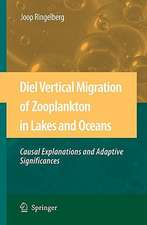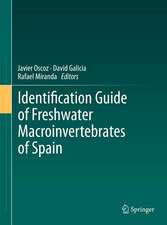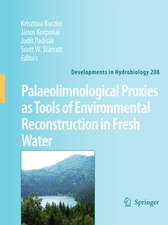Quantitative Information Fusion for Hydrological Sciences: Studies in Computational Intelligence, cartea 79
Editat de Xing Cai, T.-C. Jim Yehen Limba Engleză Hardback – 3 ian 2008
Intelligent computation and information fusion are the key words. The aim is to provide both established scientists and graduate students with a summary of recent developments in this topic. The chapters of this edited volume cover some of the most important ingredients for quantitative hydrological information fusion, including data fusion techniques, interactive computational environments, and supporting mathematical and numerical methods. Real-life applications of hydrological information fusion are also addressed.
| Toate formatele și edițiile | Preț | Express |
|---|---|---|
| Paperback (1) | 554.42 lei 38-44 zile | |
| Springer Berlin, Heidelberg – 20 noi 2010 | 554.42 lei 38-44 zile | |
| Hardback (1) | 642.51 lei 6-8 săpt. | |
| Springer Berlin, Heidelberg – 3 ian 2008 | 642.51 lei 6-8 săpt. |
Din seria Studies in Computational Intelligence
- 20%
 Preț: 449.37 lei
Preț: 449.37 lei - 20%
 Preț: 1158.26 lei
Preț: 1158.26 lei - 20%
 Preț: 986.66 lei
Preț: 986.66 lei - 20%
 Preț: 1452.76 lei
Preț: 1452.76 lei - 20%
 Preț: 168.78 lei
Preț: 168.78 lei - 20%
 Preț: 1291.10 lei
Preț: 1291.10 lei - 18%
 Preț: 1112.30 lei
Preț: 1112.30 lei - 20%
 Preț: 565.39 lei
Preț: 565.39 lei - 20%
 Preț: 649.28 lei
Preț: 649.28 lei - 20%
 Preț: 1047.73 lei
Preț: 1047.73 lei - 20%
 Preț: 1578.96 lei
Preț: 1578.96 lei - 20%
 Preț: 643.50 lei
Preț: 643.50 lei - 20%
 Preț: 657.49 lei
Preț: 657.49 lei - 20%
 Preț: 993.28 lei
Preț: 993.28 lei - 20%
 Preț: 990.80 lei
Preț: 990.80 lei - 20%
 Preț: 989.96 lei
Preț: 989.96 lei - 20%
 Preț: 1165.69 lei
Preț: 1165.69 lei - 20%
 Preț: 1444.52 lei
Preț: 1444.52 lei - 20%
 Preț: 1041.96 lei
Preț: 1041.96 lei - 20%
 Preț: 1047.73 lei
Preț: 1047.73 lei - 20%
 Preț: 1046.06 lei
Preț: 1046.06 lei - 18%
 Preț: 2500.50 lei
Preț: 2500.50 lei - 20%
 Preț: 989.13 lei
Preț: 989.13 lei - 20%
 Preț: 1165.69 lei
Preț: 1165.69 lei - 20%
 Preț: 1164.05 lei
Preț: 1164.05 lei - 20%
 Preț: 1042.79 lei
Preț: 1042.79 lei - 20%
 Preț: 1460.19 lei
Preț: 1460.19 lei - 18%
 Preț: 1403.52 lei
Preț: 1403.52 lei - 18%
 Preț: 1124.92 lei
Preț: 1124.92 lei - 20%
 Preț: 1039.47 lei
Preț: 1039.47 lei - 20%
 Preț: 1008.11 lei
Preț: 1008.11 lei - 20%
 Preț: 1045.25 lei
Preț: 1045.25 lei - 20%
 Preț: 1275.42 lei
Preț: 1275.42 lei - 20%
 Preț: 1040.32 lei
Preț: 1040.32 lei - 20%
 Preț: 988.32 lei
Preț: 988.32 lei - 20%
 Preț: 1169.79 lei
Preț: 1169.79 lei - 20%
 Preț: 1162.37 lei
Preț: 1162.37 lei - 20%
 Preț: 1059.26 lei
Preț: 1059.26 lei - 20%
 Preț: 1164.05 lei
Preț: 1164.05 lei - 20%
 Preț: 1166.52 lei
Preț: 1166.52 lei - 20%
 Preț: 1459.38 lei
Preț: 1459.38 lei - 18%
 Preț: 1005.74 lei
Preț: 1005.74 lei - 20%
 Preț: 997.38 lei
Preț: 997.38 lei - 20%
 Preț: 1055.94 lei
Preț: 1055.94 lei - 20%
 Preț: 1284.47 lei
Preț: 1284.47 lei - 20%
 Preț: 994.08 lei
Preț: 994.08 lei - 20%
 Preț: 1048.72 lei
Preț: 1048.72 lei - 20%
 Preț: 1066.02 lei
Preț: 1066.02 lei - 20%
 Preț: 943.78 lei
Preț: 943.78 lei - 20%
 Preț: 1173.10 lei
Preț: 1173.10 lei
Preț: 642.51 lei
Preț vechi: 755.88 lei
-15% Nou
Puncte Express: 964
Preț estimativ în valută:
122.98€ • 133.63$ • 103.37£
122.98€ • 133.63$ • 103.37£
Carte tipărită la comandă
Livrare economică 21 aprilie-05 mai
Preluare comenzi: 021 569.72.76
Specificații
ISBN-13: 9783540753834
ISBN-10: 3540753834
Pagini: 251
Ilustrații: IX, 218 p.
Dimensiuni: 155 x 235 x 15 mm
Greutate: 0.48 kg
Ediția:2008
Editura: Springer Berlin, Heidelberg
Colecția Springer
Seria Studies in Computational Intelligence
Locul publicării:Berlin, Heidelberg, Germany
ISBN-10: 3540753834
Pagini: 251
Ilustrații: IX, 218 p.
Dimensiuni: 155 x 235 x 15 mm
Greutate: 0.48 kg
Ediția:2008
Editura: Springer Berlin, Heidelberg
Colecția Springer
Seria Studies in Computational Intelligence
Locul publicării:Berlin, Heidelberg, Germany
Public țintă
ResearchCuprins
Data Fusion Methods for Integrating Data-driven Hydrological Models.- A New Paradigm for Groundwater Modeling.- Information Fusion using the Kalman Filter based on Karhunen-Loève Decomposition.- Trajectory-Based Methods for Modeling and Characterization.- The Role of Streamline Models for Dynamic Data Assimilation in Petroleum Engineering and Hydrogeology.- Information Fusion in Regularized Inversion of Tomographic Pumping Tests.- Advancing the Use of Satellite Rainfall Datasets for Flood Prediction in Ungauged Basins: The Role of Scale, Hydrologic Process Controls and the Global Precipitation Measurement Mission.- Integrated Methods for Urban Groundwater Management Considering Subsurface Heterogeneity.
Textul de pe ultima copertă
In a rapidly evolving world of knowledge and technology, do you ever wonder how hydrology is catching up? This book takes the angle of computational hydrology and
envisions one of the future directions, namely, quantitative integration of high-quality hydrologic field data with geologic, hydrologic, chemical, atmospheric, and biological information to characterize and predict natural systems in hydrological sciences.
Intelligent computation and information fusion are the key words. The aim is to provide both established scientists and graduate students with a summary of recent developments in this topic. The chapters of this edited volume cover some of the most important ingredients for quantitative hydrological information fusion, including data fusion techniques, interactive computational environments, and supporting mathematical and numerical methods. Real-life applications of hydrological information fusion are also addressed.
envisions one of the future directions, namely, quantitative integration of high-quality hydrologic field data with geologic, hydrologic, chemical, atmospheric, and biological information to characterize and predict natural systems in hydrological sciences.
Intelligent computation and information fusion are the key words. The aim is to provide both established scientists and graduate students with a summary of recent developments in this topic. The chapters of this edited volume cover some of the most important ingredients for quantitative hydrological information fusion, including data fusion techniques, interactive computational environments, and supporting mathematical and numerical methods. Real-life applications of hydrological information fusion are also addressed.
Caracteristici
edited overview about quantitative information fusion in hydrology Includes supplementary material: sn.pub/extras















